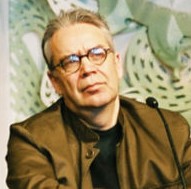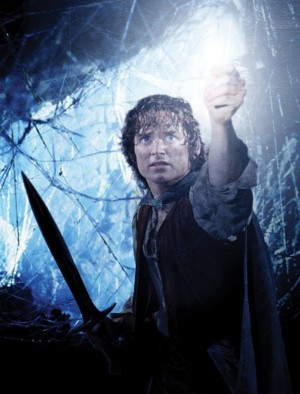|
Composer Howard Shore has enjoyed a solid, if unremarkable, career since 1969 as a founding member of the group, Lighthouse, with whom he performed and toured until 1972. He was hired by producer Lorne Michaels and NBC in 1975 for a new late night comedy series they were developing called Saturday Night Live, becoming the historic ensemble's original music director, and performing live each week on national television until 1980.
| It was during the run of the famed comedy series that he began an association with fellow Canadian, David Cronenberg, composing the music for many of the iconic director's most interesting early films. Beginning with The Brood in 1979, Shore developed a natural talent for writing dark, tortured, symphonic background scores for such films as Scanners (1981), Videodrome (1983), Dead Ringers (1988), and the powerful, ground breaking music for the director's most stunning achievement, The Fly (1986). |
Read more Vertlieb's Views
Time Changes Everything: A Reassessment of Peter Jackson's King Kong
How I Met...The Blob
Jeff Wayne's musical The War of the Worlds
|
It was with this horrific film and score that Howard Shore first began his journey and ascent into more serious and notable achievement. The score for The Fly is nearly operatic in its significance and melodic intensity, a remarkable early reminder that when called upon to deliver the goods, Shore could and would astound both his critics and admirers.
So powerful were the operatic roots of The Fly that the composer has adapted his work for a brand new, two act opera premiering first in July, 2008, at the Theatre du Chatelet in Paris and, later, for its United States premiere with the Los Angeles Opera in September, 2008. David Cronenberg is directing both classical events, while world renowned tenor Placido Domingo will be conducting the orchestral presentation and production.
Despite the significance of his important work in the Cronenberg film, Shore found his newly realized compositional gifts under appreciated and under realized. After a virtual parade of mundane, flat presentations, it would be fifteen years until the composer's hidden gifts would be called into prominence once more.
| When Peter Jackson began pre-production on the Lord of the Rings trilogy, Howard Shore would not have seemed the likeliest choice for a composer to translate Tolkien's epic vision. As a matter of record, the selection of Shore to bring the beloved stories musically to life was questioned on a variety film music web sites. Would Howard Shore possess the creative juices necessary to tackle so complex, and ambitious an endeavor? The answer would be forthcoming with the 2001 release of Lord of the Rings: The Fellowship of the Ring. By no means a traditional score, Howard Shore proved to virtually all of his critics that he was, indeed, up to the chore, fulfilling the early promise exhibited so dramatically in David Cronenberg's The Fly fifteen years earlier. |
 |
Shore's work on Lord of the Rings was exceedingly more thoughtful than anyone could have imagined. Rarely showy or flamboyant but, rather, quietly articulate, the composer created an elegent, atypical work of intelligence and sensitivity. One year later, Peter Jackson followed his first triumph with the second in the Rings trilogy, Lord of the Rings: The Two Towers (2002). More grandiose and provocative than the first, The Two Towers created an expansive, visionary spectacle over powering in its immensity.
Howard Shore rose to the occasion once more with his nearly ethereal score adorning the middle portion of Middle Earth. Filled with enchanting Celtic themes, and darkly introspective rhapsodies, The Two Towers remains both a visual and symphonic triumph on every imaginable level.

Howard Shore |
In 2003, Peter Jackson combined forces once more with his now esteemed colleague to create the third and final act of J.R.R. Tolkien's mythic fantasy, Lord of the Rings: The Return of the King.
The crowning achievement of Jackson's career, the final installment of the breath taking extravaganza proved so towering an achievement that it swept the Oscars the next year, winning the coveted Academy Award for Best Picture, Best Director, and Best Score for composer Howard Shore who had risen valiantly from the ashes of mediocrity to capture the most respected symbol of success in the motion picture industry. |
Shore's double win that storied evening, winning both for Best Score and Best Song (Into The West) silenced the composer's doubters and detractors once and for all, reducing the shell shocked musician to stunned, and tear laden acceptance. Now Reprise Records, founded by the late Frank Sinatra, has embarked upon their own ambitious journey with the much anticipated four CD release of Lord of the Rings: The Return of the King - The Complete Recordings, a stunning, evocative representation of the Oscar winning score.
Lavishly produced, and featuring fifty-three tracks from the original master tapes of the soundtrack recordings, Lord of the Rings: The Return of the King is a work of consummate grandeur. Mournful and melancholy, Shore's redemptive work is the rhapsodic adhesion bridging Jackson's thematic verse in hauntingly eerie splendor. From the opening notes, structured in near operatic, yet tranquil assurance, the listener has begun a portentious journey of imposing elegance through strange and disturbing lands of demonic design, and reptilian habitation.
A majestic chorus awakens endless night with spectral excitement, the inspiring invisible cloak leading courageous warriors into ominous battle against the forces of darkness, for this is a noble, heroic ascent into moral supremacy and legend.
| Howard Shore's triumphant summation to the epic struggle for good against ancient evil is transcribed upon ancient parchments, inscribed in blood and valiant sacrifice in the hearts and minds of those tiny souls whose selfless wanderings would ultimately give freedom to an empire and her children. A dream was born and given poetic expression in the minds and hearts of millions of readers, and film audiences around the world--a wondrous imagining of little souls who would conquer both their size and their fears--a world of Hobbits and sorcerers in which a gentle dwarf named Frodo would rise above giants to bring equality and justice to his people.
Peter Jackson's brilliant Lord of the Rings trilogy remains, perhaps, the purest, most perfect story telling in fantasy film history, and its musical celebration, by composer Howard Shore, a wondrous musical Reprise in Celtic song, score, and myth--"the stuff that dreams are made of."
|
 |
Steve Vertlieb
|






